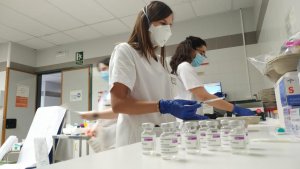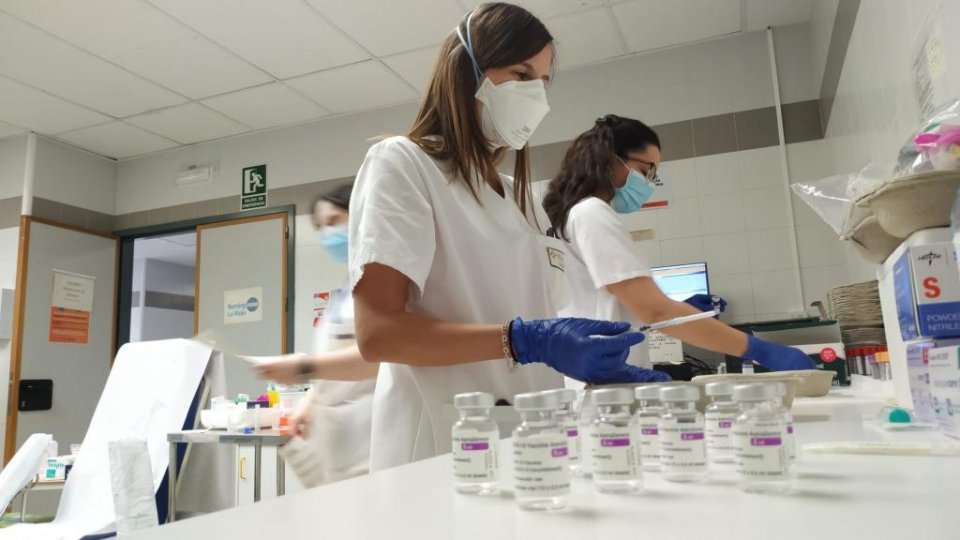Latest: Coronavirus in Spain figures (26 Apr)
Spain is to start a clinical trial of administering a second jab of the Pfizer vaccine against Covid-19 to citizens who have already received a first dose of AstraZeneca.
The trial follows Spain’s recent decision to currently limit the use of the AstraZeneca vaccine to citizens aged between 60-69. Spain had also prioritised giving citizens aged between 70–79 jabs of Johnson & Johnson’s one-dose Janssen vaccine – but the pharmaceutical group has temporarily delayed their rollout of the vaccine in Europe, following the USA regulators’ recommendation to pause its use because of possible links to rare blood clots.
Along with several other EU countries, Spain has restricted the AstraZeneca vaccine to people over 60 after regulators also linked it to a rare form of brain blood clots, mostly in younger women.
Latest figures (up to 19 April) show that Spain has administered 3,151,601 first jabs of the AstraZeneca vaccine, but only 196 people have received a second jab of it. It is not clear how many people aged under 60 have received a first dose of the vaccine, as Spain had also been administering it to essential workers and teachers aged up 55, following earlier changes in the vaccination strategy.
Spain’s Carlos III Health Institute (ISCIII) is to be the promoter of the clinical trial to mix the vaccines. The trial, called CombivacS, will analyse the possible protective effect and safety of supplying a dose of Pfizer to people who have already received a first dose of AstraZeneca, after a minimum of 8 weeks have elapsed since that first dose.
‘After decisions by various European public health authorities to suspend use of the AstraZeneca vaccine in under 60-year-olds, we are setting out to urgently find scientific evidence to support decision-making around possible alternatives,’ Raquel Yotti, director of the Carlos III Health Institute, told a news conference this week.
The trial will draw on a sample of 600 people of all ages from across Spain, said Jesus Frias Iniesta, clinical research coordinator at Carlos III.
‘The study’s objective is … to determine within 28 days whether a second dose of the Pfizer vaccine can be given to patients who have received the AstraZeneca vaccine,’ he said.

A British study on mixing vaccines was expanded last week to include shots made by Moderna and Novavax, while France and Germany are also considering giving an alternative to under 60s who received a first dose of AstraZeneca.
Separately, Spanish media have also been reporting that the health ministry is considering delaying second doses for those aged under 80 in order to maximise the number of people who received at least one jab.
Patients would now receive a second shot of vaccines produced by Pfizer and Moderna eight weeks after the first, El Mundo newspaper first reported. The European Medicines Agency (EMA) has recommended a 28-day gap between Moderna shots and 21 days between Pfizer. UPDATE [20 Apr]: Spain’s health ministry has since stated that it will not be extending the recommend periods.
Despite delays to the deployment of the Janssen vaccine and supply disruptions at AstraZeneca, Spain still aims to have half its 47 million population fully inoculated by late July.
Latest figures overall (up to 19 April) show that Spain has received 13,703,085 doses of Covid-19 vaccines and that 12,853,599 jabs have been administered. 9,441,685people have now received at least one jab, representing 19.9% of the population. 3,411,914 people have now received a second jab, which is 7.2% of the population. In a separate report, we publish the amount of vaccines received and administered for each region in Spain: Covid-19 Vaccinations in Spain
Click here for all previous reports on: Coronavirus in Spain
Sign up for the FREE Weekly Newsletter from Spain in English.
Please support Spain in English with a donation.
Click here to get your business activity or services listed on our DIRECTORY.
Click here for further details on how to ADVERTISE with us.



